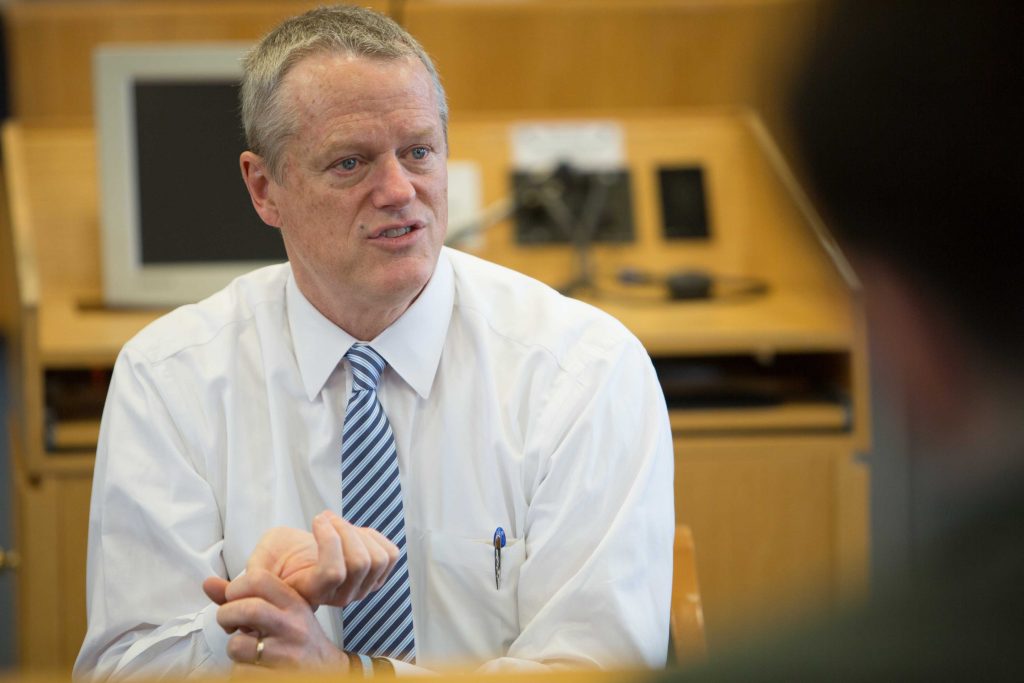Massachusetts Governor Charlie Baker sat down with health law students at Boston College Law School April 17 at the invitation of the Rappaport Center for Law and Public Policy. He discussed health care policy generally, and the opioid crisis particularly, both of which have been key priorities of his administration.
“In the past 50 years, nothing has slowed down the average life expectancy of Americans like the opioid crisis,” Baker told students in Dean Hashimoto’s Business Law & Health Enterprise class and Alice Noble’s Health Law class.
Baker is no stranger to health care. A former CEO of Harvard Pilgrim Health Care, he has focused as governor on collecting data and working to find methods to curb addiction and addiction-related deaths. The Baker Administration has created and is continuing to craft more tools for treatment and prevention.
He gave as examples two legislative efforts, the STEP Act and the CARE Act.
In 2016, the STEP Act was passed which 1) creates a seven-day supply limit on all first-time opioid prescriptions, 2) allows the option to only fill part of the prescription without forfeiting the remainder of it; and 3) mandates that every school district in the state create substance use and abuse education programs and screening methods.
The CARE Act, currently confirmed by the Senate but not yet passed, includes a revised proposal that would allow involuntary commitment to a treatment facility for 72 hours for those who present a danger to themselves and/or others resulting from addiction. Instead of holding the individual at the emergency room, clinicians will be able to order the person be transported to a treatment facility. The bill will also allow treatment facilities to petition the court under civil commitment procedures to hold individuals beyond 72 hours.
“If you have overdosed and ended up in the emergency room a couple of times, your chances of ultimately succumbing to your death are 10 times greater than for people who are trying to overcome their addiction,” Baker said. “The data on people who actually were committed is just the opposite: 98 percent of them are still alive a year later.
“I’m a big believer that for people with an opioid addiction, the more paths to treatment you can create, the more likely you are to succeed in finding a method that sticks,” he added.
The state has made strides to implement additional overdose prevention methods, including access to naloxone, an emergency treatment for overdoses. Baker explained that two years ago, medical providers were not required to take a course on opioids and pain management. Today, they cannot graduate without such a course. In turn, renewals of licenses require taking a related educational course.
Other efforts are also in the works. “We’re one of the only states in the country that actually saw a drop in deaths and prescriptions, and a leveling off of overdoses last year,” Baker said. “I would argue that’s a combination of doing a better job of prescribing by creating a seven-day limit on a first supply and the availability of naloxone on the frontlines. Deaths are down about 8 percent and would likely be down about 25 percent if it weren’t for fentanyl.”
On another health care front, the governor said Massachusetts is working to mitigate rising prescription costs. The state has been in communication with the Federal Drug Administration (FDA) about accelerating approvals for generic versions of drugs that are already approved and on the market. In addition, Baker said the state filed a waiver with the federal government that would “give a little more latitude” with Massachusetts Medicaid’s process of approving specialty drugs and drugs that receive accelerated approval from the FDA.


